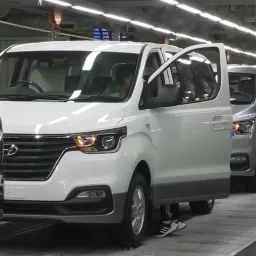Manufacturing Excellence
Korean automakers, particularly Hyundai Motor Company and Kia Corporation, have earned a reputation for manufacturing excellence
 Automobile & Machinery:
Korean Automobile industries have made significant strides in the global market, showcasing technological advancements, and high-quality manufacturing.
Automobile & Machinery:
Korean Automobile industries have made significant strides in the global market, showcasing technological advancements, and high-quality manufacturing.
Korean automakers, particularly Hyundai Motor Company and Kia Corporation, have earned a reputation for manufacturing excellence, and their success can be attributed to several key factors that highlight their commitment to efficient and advanced manufacturing processes.
1. Quality Control:
- Korean automakers place a strong emphasis on quality control throughout the manufacturing process. Rigorous quality checks and inspections are conducted at various stages, from raw materials to final assembly. This commitment to quality helps ensure that the finished vehicles meet or exceed international standards.
2. Technological Integration:
- Hyundai and Kia have embraced advanced technologies in their manufacturing processes. Automation, robotics, and state-of-the-art machinery are integrated into their production lines to enhance precision and efficiency. These technologies contribute to improved consistency in manufacturing, reducing the likelihood of defects.
3. Lean Production Methods:
- Both companies have adopted lean production methods, inspired by principles such as the Toyota Production System. This approach focuses on minimizing waste, optimizing efficiency, and continually improving processes. By implementing lean manufacturing, Hyundai and Kia can streamline operations, reduce costs, and respond more quickly to changes in market demand.
4. Flexible Manufacturing Systems:
- Korean automakers are known for their flexible manufacturing systems, allowing them to adapt to changes in consumer preferences and market trends. This flexibility enables them to efficiently produce a diverse range of vehicles, from sedans and SUVs to electric cars and hybrids, without compromising on quality or efficiency.
5. Research and Development:
- Continuous investment in research and development is a cornerstone of manufacturing excellence for Hyundai and Kia. By staying at the forefront of automotive technology, they can integrate innovative solutions into their manufacturing processes. This includes advancements in materials, production techniques, and sustainable practices.
6. Supplier Relationships:
- Building strong relationships with suppliers is crucial in maintaining a high standard of quality. Korean automakers work closely with their suppliers to ensure a reliable and efficient supply chain. Collaborative efforts with suppliers contribute to the overall efficiency and quality of the manufacturing process.
7. Environmental Sustainability:
- Both Hyundai and Kia are committed to environmental sustainability in their manufacturing processes. Efforts include energy-efficient facilities, waste reduction, and eco-friendly production methods. This commitment aligns with global trends toward environmentally conscious manufacturing practices.
8. Global Standards Compliance:
- Korean automakers adhere to international quality and safety standards. This commitment is essential for meeting regulatory requirements in various markets globally. Adhering to these standards ensures that vehicles manufactured by Hyundai and Kia are not only high-quality but also compliant with the regulations of the countries in which they are sold.
In conclusion, Korean automakers have earned their reputation for manufacturing excellence by adopting efficient, advanced, and flexible manufacturing processes. Their commitment to quality control, technological integration, lean production methods, and sustainability reflects a dedication to delivering high-quality vehicles to consumers worldwide. This manufacturing excellence is a key factor in their continued success in the competitive global automotive market.